Ethical Issues for Running a Small Web Application
VerifiedAdded on 2022/12/29
|7
|1573
|1
Report
AI Summary
This report delves into the ethical and legal challenges faced when launching a web application for an e-commerce start-up. It identifies critical issues such as data theft and customer privacy breaches, emphasizing the importance of secure website protocols like HTTPs/SSL and adherence to PCI compliance. The report stresses the significance of choosing the right e-commerce platform and ensuring accurate product listings to maintain customer trust and avoid legal repercussions. Additionally, it highlights the need to comply with online selling laws, including data compliance, privacy regulations, and advertising disclosure laws. The report also warns against the ethical violations associated with selling counterfeit products and provides recommendations for maintaining business ethics, which is crucial for building credibility and long-term success in the competitive digital environment. The report references various academic sources to support its findings.
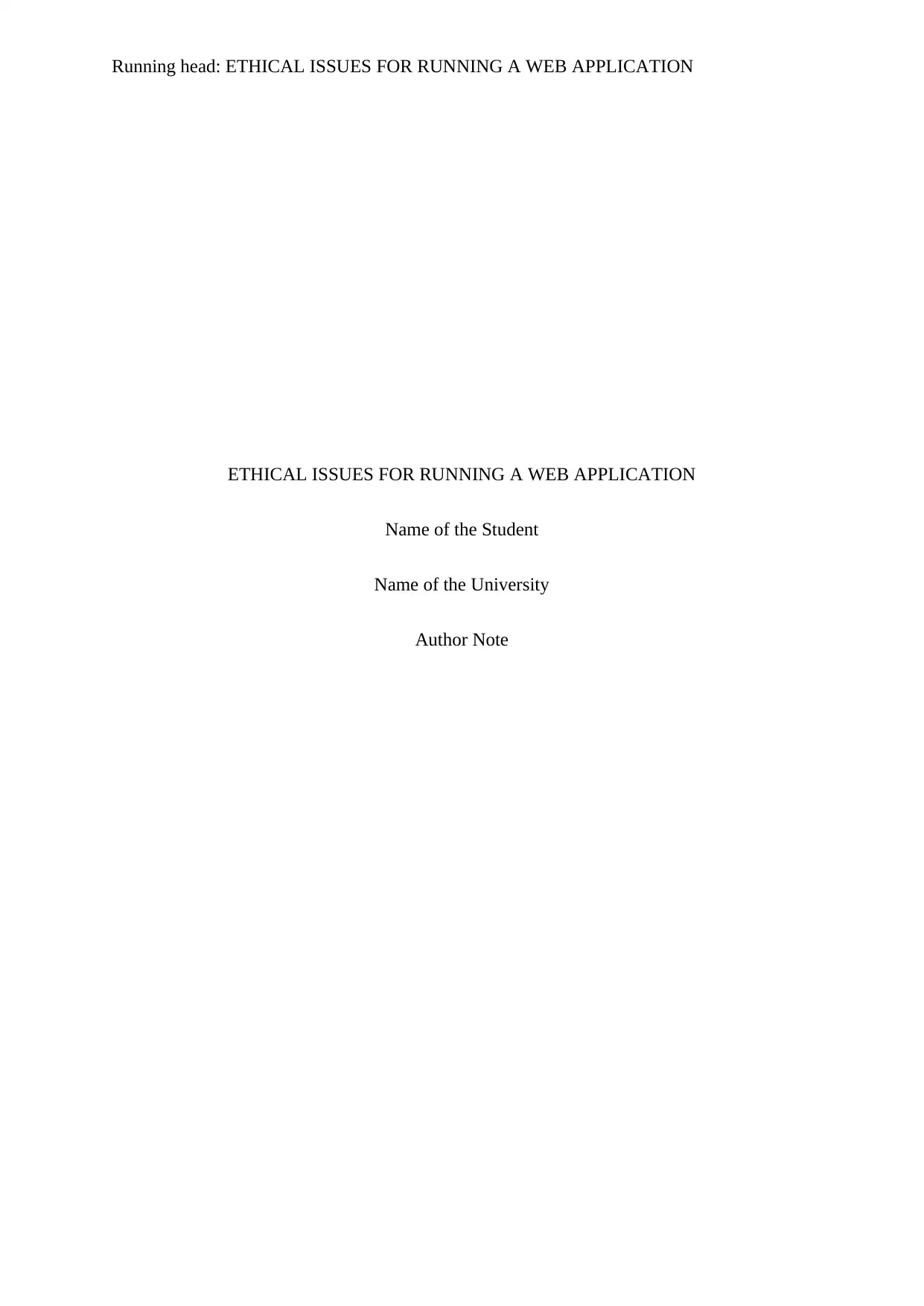
Running head: ETHICAL ISSUES FOR RUNNING A WEB APPLICATION
ETHICAL ISSUES FOR RUNNING A WEB APPLICATION
Name of the Student
Name of the University
Author Note
ETHICAL ISSUES FOR RUNNING A WEB APPLICATION
Name of the Student
Name of the University
Author Note
Paraphrase This Document
Need a fresh take? Get an instant paraphrase of this document with our AI Paraphraser
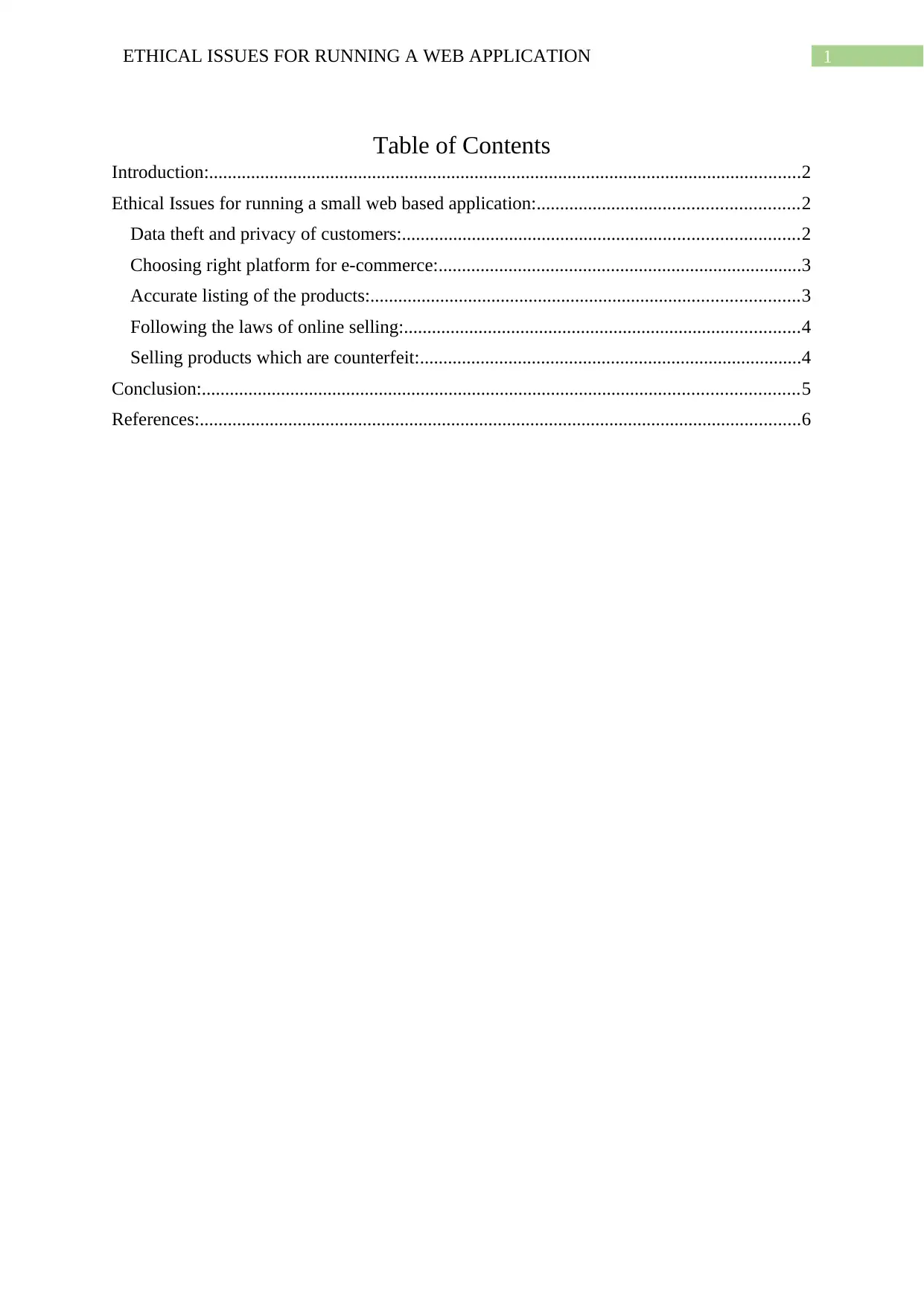
1ETHICAL ISSUES FOR RUNNING A WEB APPLICATION
Table of Contents
Introduction:...............................................................................................................................2
Ethical Issues for running a small web based application:........................................................2
Data theft and privacy of customers:.....................................................................................2
Choosing right platform for e-commerce:..............................................................................3
Accurate listing of the products:............................................................................................3
Following the laws of online selling:.....................................................................................4
Selling products which are counterfeit:..................................................................................4
Conclusion:................................................................................................................................5
References:.................................................................................................................................6
Table of Contents
Introduction:...............................................................................................................................2
Ethical Issues for running a small web based application:........................................................2
Data theft and privacy of customers:.....................................................................................2
Choosing right platform for e-commerce:..............................................................................3
Accurate listing of the products:............................................................................................3
Following the laws of online selling:.....................................................................................4
Selling products which are counterfeit:..................................................................................4
Conclusion:................................................................................................................................5
References:.................................................................................................................................6
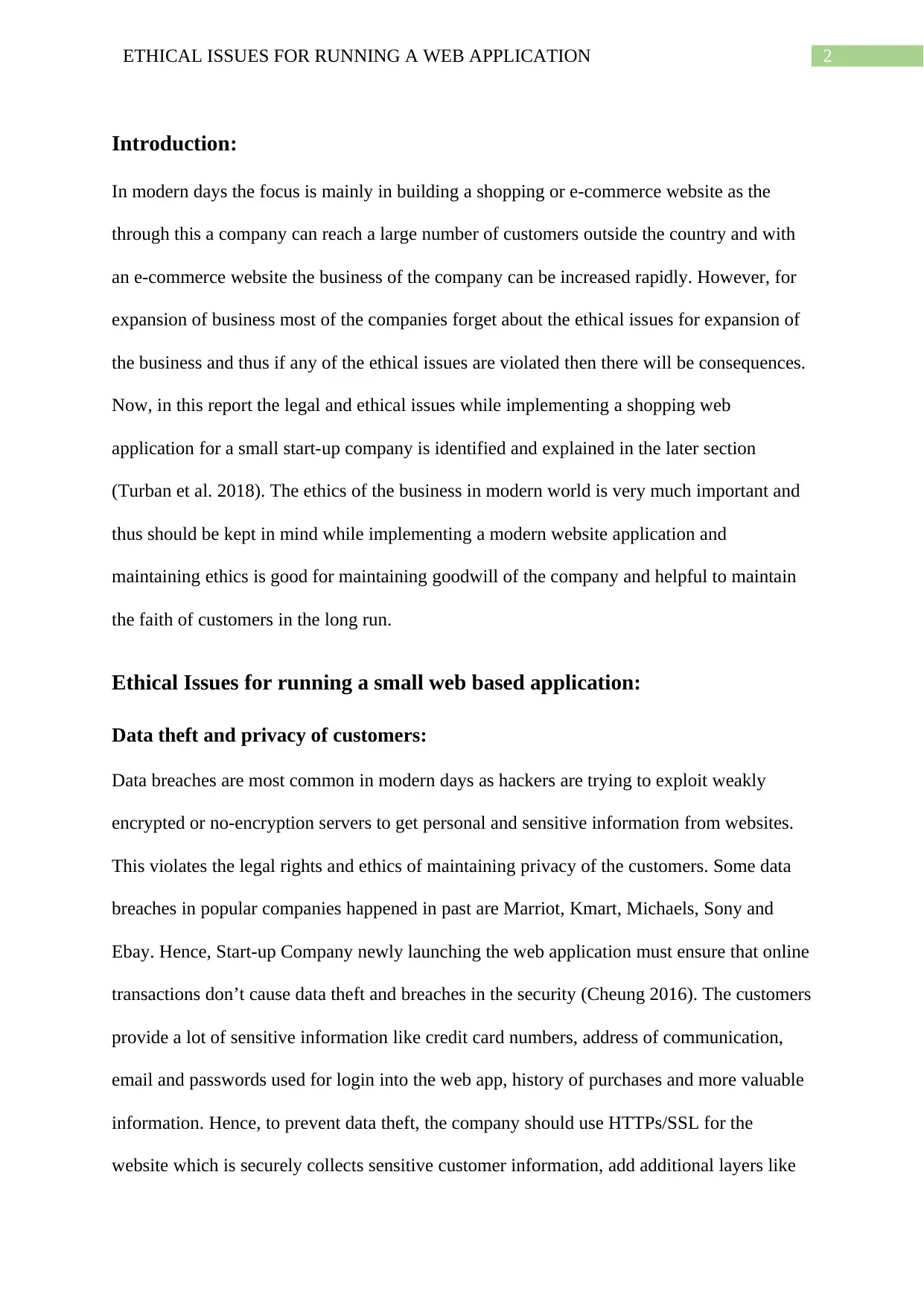
2ETHICAL ISSUES FOR RUNNING A WEB APPLICATION
Introduction:
In modern days the focus is mainly in building a shopping or e-commerce website as the
through this a company can reach a large number of customers outside the country and with
an e-commerce website the business of the company can be increased rapidly. However, for
expansion of business most of the companies forget about the ethical issues for expansion of
the business and thus if any of the ethical issues are violated then there will be consequences.
Now, in this report the legal and ethical issues while implementing a shopping web
application for a small start-up company is identified and explained in the later section
(Turban et al. 2018). The ethics of the business in modern world is very much important and
thus should be kept in mind while implementing a modern website application and
maintaining ethics is good for maintaining goodwill of the company and helpful to maintain
the faith of customers in the long run.
Ethical Issues for running a small web based application:
Data theft and privacy of customers:
Data breaches are most common in modern days as hackers are trying to exploit weakly
encrypted or no-encryption servers to get personal and sensitive information from websites.
This violates the legal rights and ethics of maintaining privacy of the customers. Some data
breaches in popular companies happened in past are Marriot, Kmart, Michaels, Sony and
Ebay. Hence, Start-up Company newly launching the web application must ensure that online
transactions don’t cause data theft and breaches in the security (Cheung 2016). The customers
provide a lot of sensitive information like credit card numbers, address of communication,
email and passwords used for login into the web app, history of purchases and more valuable
information. Hence, to prevent data theft, the company should use HTTPs/SSL for the
website which is securely collects sensitive customer information, add additional layers like
Introduction:
In modern days the focus is mainly in building a shopping or e-commerce website as the
through this a company can reach a large number of customers outside the country and with
an e-commerce website the business of the company can be increased rapidly. However, for
expansion of business most of the companies forget about the ethical issues for expansion of
the business and thus if any of the ethical issues are violated then there will be consequences.
Now, in this report the legal and ethical issues while implementing a shopping web
application for a small start-up company is identified and explained in the later section
(Turban et al. 2018). The ethics of the business in modern world is very much important and
thus should be kept in mind while implementing a modern website application and
maintaining ethics is good for maintaining goodwill of the company and helpful to maintain
the faith of customers in the long run.
Ethical Issues for running a small web based application:
Data theft and privacy of customers:
Data breaches are most common in modern days as hackers are trying to exploit weakly
encrypted or no-encryption servers to get personal and sensitive information from websites.
This violates the legal rights and ethics of maintaining privacy of the customers. Some data
breaches in popular companies happened in past are Marriot, Kmart, Michaels, Sony and
Ebay. Hence, Start-up Company newly launching the web application must ensure that online
transactions don’t cause data theft and breaches in the security (Cheung 2016). The customers
provide a lot of sensitive information like credit card numbers, address of communication,
email and passwords used for login into the web app, history of purchases and more valuable
information. Hence, to prevent data theft, the company should use HTTPs/SSL for the
website which is securely collects sensitive customer information, add additional layers like
⊘ This is a preview!⊘
Do you want full access?
Subscribe today to unlock all pages.

Trusted by 1+ million students worldwide
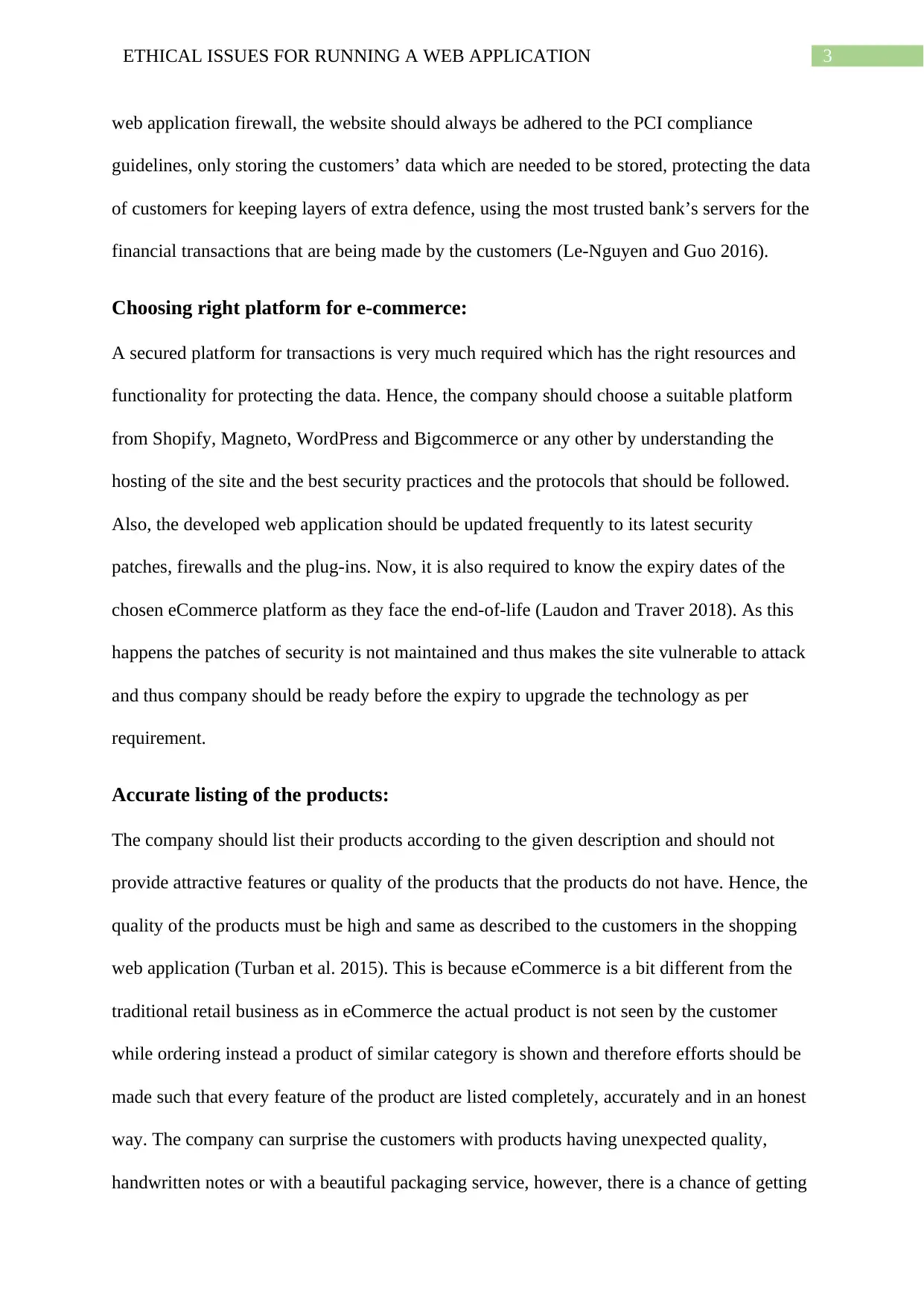
3ETHICAL ISSUES FOR RUNNING A WEB APPLICATION
web application firewall, the website should always be adhered to the PCI compliance
guidelines, only storing the customers’ data which are needed to be stored, protecting the data
of customers for keeping layers of extra defence, using the most trusted bank’s servers for the
financial transactions that are being made by the customers (Le-Nguyen and Guo 2016).
Choosing right platform for e-commerce:
A secured platform for transactions is very much required which has the right resources and
functionality for protecting the data. Hence, the company should choose a suitable platform
from Shopify, Magneto, WordPress and Bigcommerce or any other by understanding the
hosting of the site and the best security practices and the protocols that should be followed.
Also, the developed web application should be updated frequently to its latest security
patches, firewalls and the plug-ins. Now, it is also required to know the expiry dates of the
chosen eCommerce platform as they face the end-of-life (Laudon and Traver 2018). As this
happens the patches of security is not maintained and thus makes the site vulnerable to attack
and thus company should be ready before the expiry to upgrade the technology as per
requirement.
Accurate listing of the products:
The company should list their products according to the given description and should not
provide attractive features or quality of the products that the products do not have. Hence, the
quality of the products must be high and same as described to the customers in the shopping
web application (Turban et al. 2015). This is because eCommerce is a bit different from the
traditional retail business as in eCommerce the actual product is not seen by the customer
while ordering instead a product of similar category is shown and therefore efforts should be
made such that every feature of the product are listed completely, accurately and in an honest
way. The company can surprise the customers with products having unexpected quality,
handwritten notes or with a beautiful packaging service, however, there is a chance of getting
web application firewall, the website should always be adhered to the PCI compliance
guidelines, only storing the customers’ data which are needed to be stored, protecting the data
of customers for keeping layers of extra defence, using the most trusted bank’s servers for the
financial transactions that are being made by the customers (Le-Nguyen and Guo 2016).
Choosing right platform for e-commerce:
A secured platform for transactions is very much required which has the right resources and
functionality for protecting the data. Hence, the company should choose a suitable platform
from Shopify, Magneto, WordPress and Bigcommerce or any other by understanding the
hosting of the site and the best security practices and the protocols that should be followed.
Also, the developed web application should be updated frequently to its latest security
patches, firewalls and the plug-ins. Now, it is also required to know the expiry dates of the
chosen eCommerce platform as they face the end-of-life (Laudon and Traver 2018). As this
happens the patches of security is not maintained and thus makes the site vulnerable to attack
and thus company should be ready before the expiry to upgrade the technology as per
requirement.
Accurate listing of the products:
The company should list their products according to the given description and should not
provide attractive features or quality of the products that the products do not have. Hence, the
quality of the products must be high and same as described to the customers in the shopping
web application (Turban et al. 2015). This is because eCommerce is a bit different from the
traditional retail business as in eCommerce the actual product is not seen by the customer
while ordering instead a product of similar category is shown and therefore efforts should be
made such that every feature of the product are listed completely, accurately and in an honest
way. The company can surprise the customers with products having unexpected quality,
handwritten notes or with a beautiful packaging service, however, there is a chance of getting
Paraphrase This Document
Need a fresh take? Get an instant paraphrase of this document with our AI Paraphraser
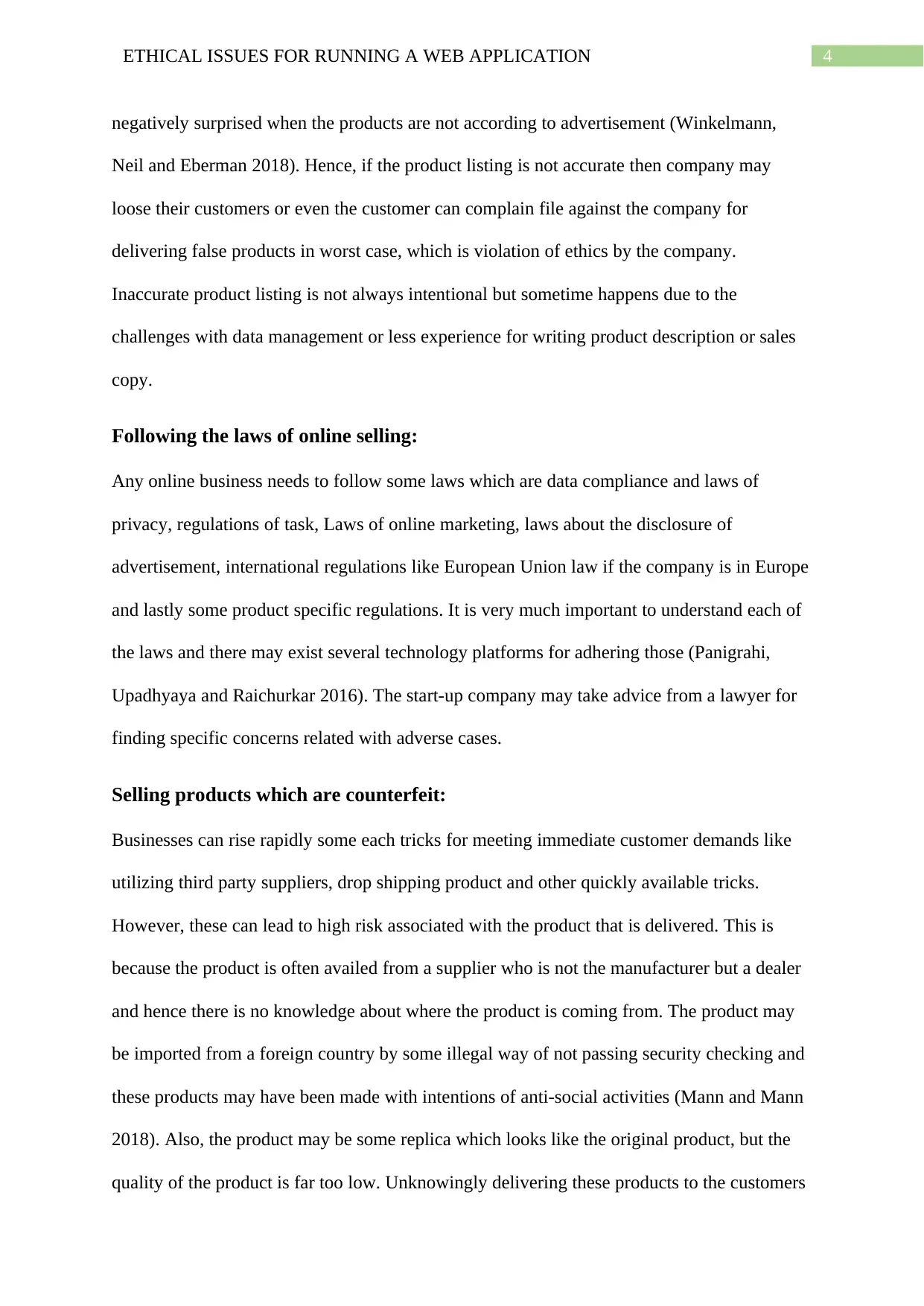
4ETHICAL ISSUES FOR RUNNING A WEB APPLICATION
negatively surprised when the products are not according to advertisement (Winkelmann,
Neil and Eberman 2018). Hence, if the product listing is not accurate then company may
loose their customers or even the customer can complain file against the company for
delivering false products in worst case, which is violation of ethics by the company.
Inaccurate product listing is not always intentional but sometime happens due to the
challenges with data management or less experience for writing product description or sales
copy.
Following the laws of online selling:
Any online business needs to follow some laws which are data compliance and laws of
privacy, regulations of task, Laws of online marketing, laws about the disclosure of
advertisement, international regulations like European Union law if the company is in Europe
and lastly some product specific regulations. It is very much important to understand each of
the laws and there may exist several technology platforms for adhering those (Panigrahi,
Upadhyaya and Raichurkar 2016). The start-up company may take advice from a lawyer for
finding specific concerns related with adverse cases.
Selling products which are counterfeit:
Businesses can rise rapidly some each tricks for meeting immediate customer demands like
utilizing third party suppliers, drop shipping product and other quickly available tricks.
However, these can lead to high risk associated with the product that is delivered. This is
because the product is often availed from a supplier who is not the manufacturer but a dealer
and hence there is no knowledge about where the product is coming from. The product may
be imported from a foreign country by some illegal way of not passing security checking and
these products may have been made with intentions of anti-social activities (Mann and Mann
2018). Also, the product may be some replica which looks like the original product, but the
quality of the product is far too low. Unknowingly delivering these products to the customers
negatively surprised when the products are not according to advertisement (Winkelmann,
Neil and Eberman 2018). Hence, if the product listing is not accurate then company may
loose their customers or even the customer can complain file against the company for
delivering false products in worst case, which is violation of ethics by the company.
Inaccurate product listing is not always intentional but sometime happens due to the
challenges with data management or less experience for writing product description or sales
copy.
Following the laws of online selling:
Any online business needs to follow some laws which are data compliance and laws of
privacy, regulations of task, Laws of online marketing, laws about the disclosure of
advertisement, international regulations like European Union law if the company is in Europe
and lastly some product specific regulations. It is very much important to understand each of
the laws and there may exist several technology platforms for adhering those (Panigrahi,
Upadhyaya and Raichurkar 2016). The start-up company may take advice from a lawyer for
finding specific concerns related with adverse cases.
Selling products which are counterfeit:
Businesses can rise rapidly some each tricks for meeting immediate customer demands like
utilizing third party suppliers, drop shipping product and other quickly available tricks.
However, these can lead to high risk associated with the product that is delivered. This is
because the product is often availed from a supplier who is not the manufacturer but a dealer
and hence there is no knowledge about where the product is coming from. The product may
be imported from a foreign country by some illegal way of not passing security checking and
these products may have been made with intentions of anti-social activities (Mann and Mann
2018). Also, the product may be some replica which looks like the original product, but the
quality of the product is far too low. Unknowingly delivering these products to the customers
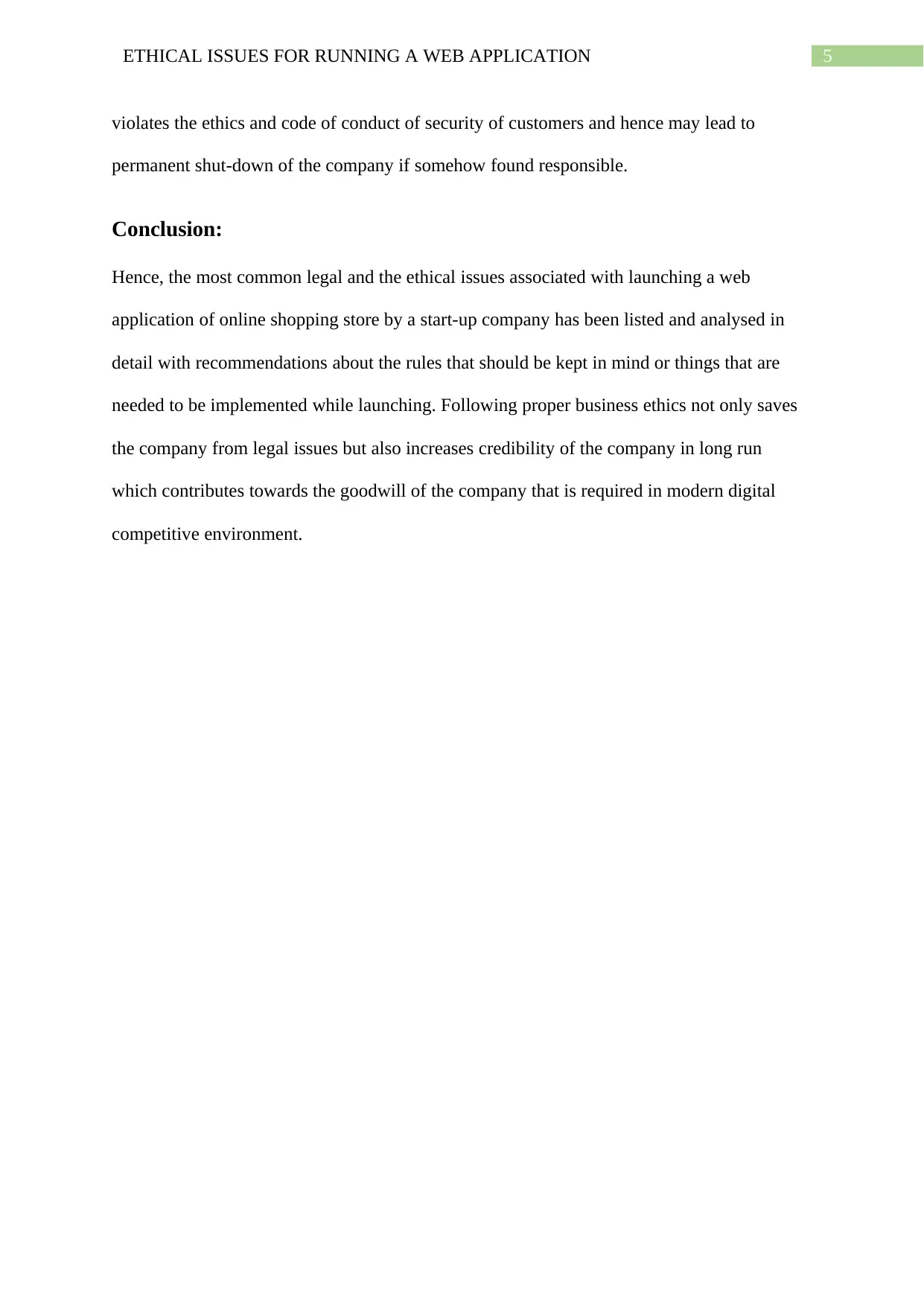
5ETHICAL ISSUES FOR RUNNING A WEB APPLICATION
violates the ethics and code of conduct of security of customers and hence may lead to
permanent shut-down of the company if somehow found responsible.
Conclusion:
Hence, the most common legal and the ethical issues associated with launching a web
application of online shopping store by a start-up company has been listed and analysed in
detail with recommendations about the rules that should be kept in mind or things that are
needed to be implemented while launching. Following proper business ethics not only saves
the company from legal issues but also increases credibility of the company in long run
which contributes towards the goodwill of the company that is required in modern digital
competitive environment.
violates the ethics and code of conduct of security of customers and hence may lead to
permanent shut-down of the company if somehow found responsible.
Conclusion:
Hence, the most common legal and the ethical issues associated with launching a web
application of online shopping store by a start-up company has been listed and analysed in
detail with recommendations about the rules that should be kept in mind or things that are
needed to be implemented while launching. Following proper business ethics not only saves
the company from legal issues but also increases credibility of the company in long run
which contributes towards the goodwill of the company that is required in modern digital
competitive environment.
⊘ This is a preview!⊘
Do you want full access?
Subscribe today to unlock all pages.

Trusted by 1+ million students worldwide
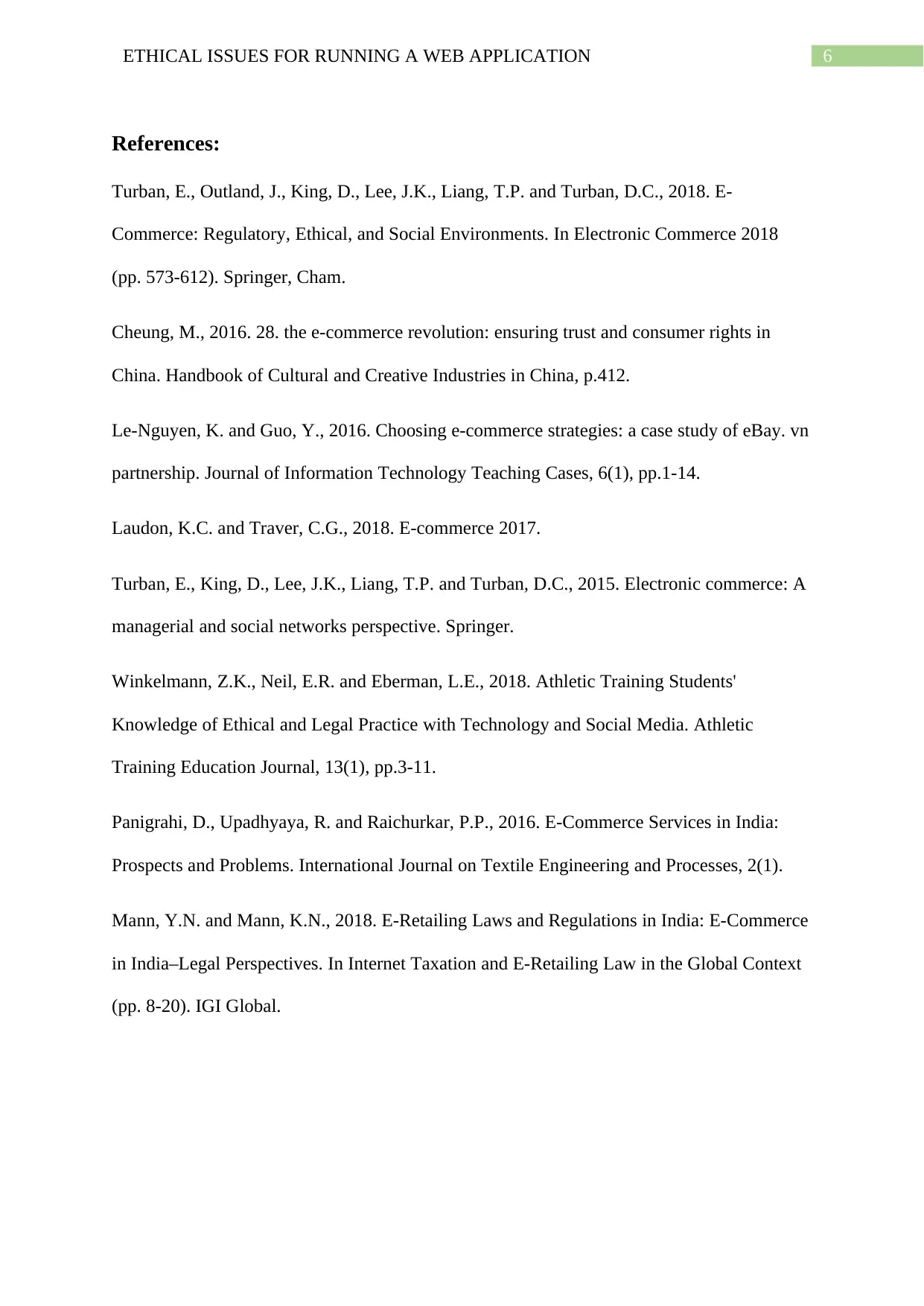
6ETHICAL ISSUES FOR RUNNING A WEB APPLICATION
References:
Turban, E., Outland, J., King, D., Lee, J.K., Liang, T.P. and Turban, D.C., 2018. E-
Commerce: Regulatory, Ethical, and Social Environments. In Electronic Commerce 2018
(pp. 573-612). Springer, Cham.
Cheung, M., 2016. 28. the e-commerce revolution: ensuring trust and consumer rights in
China. Handbook of Cultural and Creative Industries in China, p.412.
Le-Nguyen, K. and Guo, Y., 2016. Choosing e-commerce strategies: a case study of eBay. vn
partnership. Journal of Information Technology Teaching Cases, 6(1), pp.1-14.
Laudon, K.C. and Traver, C.G., 2018. E-commerce 2017.
Turban, E., King, D., Lee, J.K., Liang, T.P. and Turban, D.C., 2015. Electronic commerce: A
managerial and social networks perspective. Springer.
Winkelmann, Z.K., Neil, E.R. and Eberman, L.E., 2018. Athletic Training Students'
Knowledge of Ethical and Legal Practice with Technology and Social Media. Athletic
Training Education Journal, 13(1), pp.3-11.
Panigrahi, D., Upadhyaya, R. and Raichurkar, P.P., 2016. E-Commerce Services in India:
Prospects and Problems. International Journal on Textile Engineering and Processes, 2(1).
Mann, Y.N. and Mann, K.N., 2018. E-Retailing Laws and Regulations in India: E-Commerce
in India–Legal Perspectives. In Internet Taxation and E-Retailing Law in the Global Context
(pp. 8-20). IGI Global.
References:
Turban, E., Outland, J., King, D., Lee, J.K., Liang, T.P. and Turban, D.C., 2018. E-
Commerce: Regulatory, Ethical, and Social Environments. In Electronic Commerce 2018
(pp. 573-612). Springer, Cham.
Cheung, M., 2016. 28. the e-commerce revolution: ensuring trust and consumer rights in
China. Handbook of Cultural and Creative Industries in China, p.412.
Le-Nguyen, K. and Guo, Y., 2016. Choosing e-commerce strategies: a case study of eBay. vn
partnership. Journal of Information Technology Teaching Cases, 6(1), pp.1-14.
Laudon, K.C. and Traver, C.G., 2018. E-commerce 2017.
Turban, E., King, D., Lee, J.K., Liang, T.P. and Turban, D.C., 2015. Electronic commerce: A
managerial and social networks perspective. Springer.
Winkelmann, Z.K., Neil, E.R. and Eberman, L.E., 2018. Athletic Training Students'
Knowledge of Ethical and Legal Practice with Technology and Social Media. Athletic
Training Education Journal, 13(1), pp.3-11.
Panigrahi, D., Upadhyaya, R. and Raichurkar, P.P., 2016. E-Commerce Services in India:
Prospects and Problems. International Journal on Textile Engineering and Processes, 2(1).
Mann, Y.N. and Mann, K.N., 2018. E-Retailing Laws and Regulations in India: E-Commerce
in India–Legal Perspectives. In Internet Taxation and E-Retailing Law in the Global Context
(pp. 8-20). IGI Global.
1 out of 7
Related Documents
Your All-in-One AI-Powered Toolkit for Academic Success.
+13062052269
info@desklib.com
Available 24*7 on WhatsApp / Email
![[object Object]](/_next/static/media/star-bottom.7253800d.svg)
Unlock your academic potential
Copyright © 2020–2026 A2Z Services. All Rights Reserved. Developed and managed by ZUCOL.





